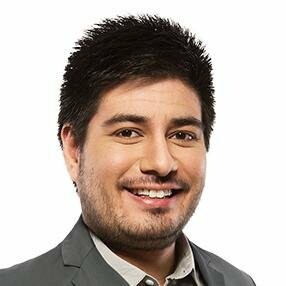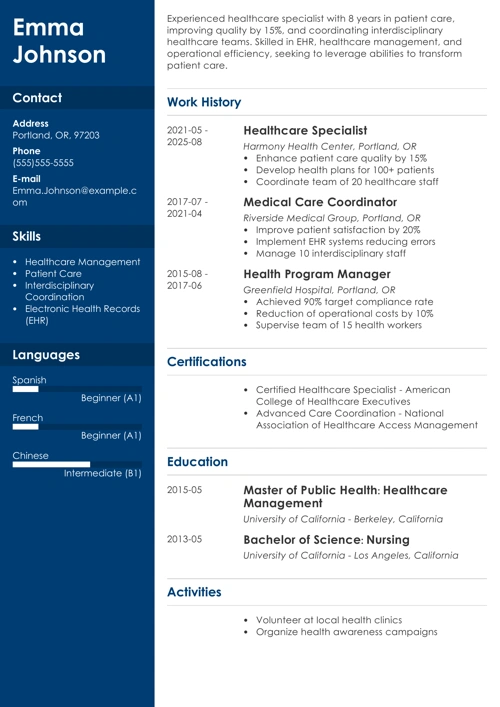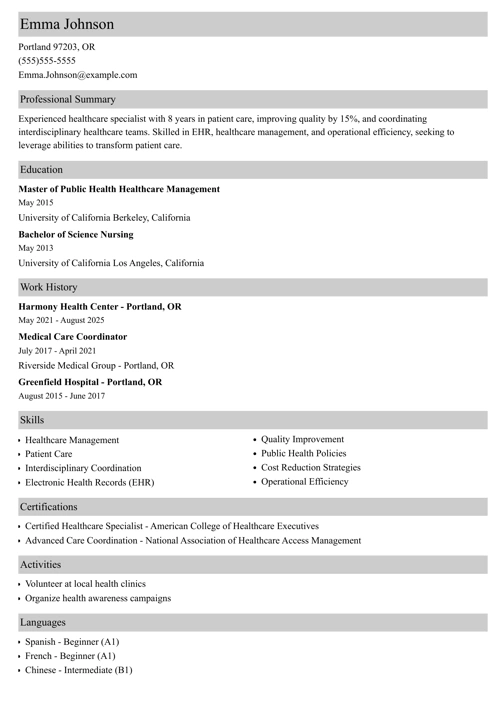It seems there’s something on the news about shortages of healthcare workers pretty much every other week. So how come it’s so hard to find a decent job as a healthcare professional? After 50+ job applications, your phone remains ominously silent.
Well, sounds like your healthcare resume needs some emergency treatment! With the right approach and scientifically proven methods, it’ll be back on its feet and winning you jobs in no time at all.
This guide will show you:
- A healthcare resume example better than 9 out of 10 other resumes.
- How to write a healthcare resume that will land you more interviews.
- Tips and examples of how to put skills and achievements on a healthcare resume.
- How to describe your experience on a resume for a healthcare worker to get any job you want.
Want to save time and have your resume ready in 5 minutes? Try our resume builder. It’s fast and easy to use. Plus, you’ll get ready-made content to add with one click. Explore our free resume templates and start building your resume today.
Sample resume made with our builder—See more resume samples here.
Here are several other healthcare-related resume example guides:
- Charge Nurse Resume
- Medical Assistant Resume
- Medical Doctor CV
- Med-Surg Nurse Resume
- NICU Nurse Resume
- Nursing Resume
- Physician CV
- RN or Registered Nurse Resume
- Sonographer Resume
- Best Professional Resume Examples
Healthcare Resume Sample
Emma Johnson
Healthcare Assistant
(555) 234-5678
emma.johnson@email.com
linkedin.com/in/emma-johnson
Summary
Compassionate and dedicated Healthcare Assistant with 8+ years of experience providing direct patient care, assisting with daily living activities, and supporting medical staff in fast-paced healthcare environments. Skilled in patient monitoring, personal care, and maintaining infection control standards. At Hope Medical Center, implemented a patient engagement initiative that improved overall satisfaction scores by 25%. Eager to bring strong caregiving and teamwork skills to Sunrise Healthcare Services.
Experience
Healthcare Assistant
Hope Medical Center, Chicago, IL
April 2018–February 2025
Key Qualifications & Responsibilities
- Assisted patients with mobility, hygiene, feeding, and other daily living activities.
- Monitored vital signs, reported patient progress, and documented observations in electronic health records (EHR).
- Provided emotional support and companionship to patients, improving their overall well-being.
- Ensured hospital rooms remained clean, sanitized, and stocked with necessary medical supplies.
- Supported nurses and physicians by preparing patients for procedures and handling administrative tasks.
Key Achievement
- Developed a patient engagement initiative that improved overall patient satisfaction scores by 25%.
Care Assistant
Maple Grove Assisted Living, Milwaukee, WI
June 2016–March 2018
Key Qualifications & Responsibilities
- Assisted elderly residents with daily care tasks, including bathing, dressing, and meal preparation.
- Administered prescribed medications under supervision and ensured adherence to care plans.
- Coordinated recreational activities to enhance social engagement and mental well-being.
- Maintained accurate records of patient conditions and reported concerns to nursing staff.
Key Achievement
- Introduced a fall prevention program that reduced incidents by 30% within six months.
Education
Diploma in Health and Social Care
Midwest Community College, Chicago, IL
September 2014–May 2016
Skills
- Personal Care & Daily Living Assistance
- Patient Monitoring & Vital Signs Tracking
- Infection Control & Hygiene Maintenance
- Medication Administration Support
- Electronic Health Records (EHR) Management
- Team Collaboration with Healthcare Professionals
- Dementia & Elderly Care Support
- Communication & Empathy
Certifications
- Certified Nursing Assistant (CNA), 2016
- Basic Life Support (BLS), American Heart Association, current
- First Aid & CPR Certification, Red Cross, current
Awards
- Outstanding Patient Care Award – Hope Medical Center, 2022
- Employee of the Month – Maple Grove Assisted Living, 2017
Memberships
- Member, National Association of Healthcare Assistants (NAHCA)
- Member, American Association of Medical Assistants (AAMA)
Interests
- Volunteering at community health fairs to promote wellness and preventive care.
- Attending professional development workshops on patient-centered care.
Above was our idea of the best healthcare resume example.
Now, let’s do yours. Here’s how to write a healthcare resume:
1. Choose the Best Format for Your Healthcare Resume
Healthcare is every aspect of medical care for an individual or community. Healthcare workers are tasked with improving health, treating diseases and injuries, preventing illnesses, and diagnosing other ailments, both physical and psychological. The purpose of a healthcare resume is to show the hiring manager that you possess the right skills, medical education, and background to be the perfect fit.
However—
Though it’s such a large umbrella term, there is a single ideal method with which to format your resume for healthcare jobs.
Here’s how to format your healthcare resume template:
- Professional resume headers begin with contact information in a resume.
- Split up the various resume categories using easy-to-read titles.
- The best resume format is usually the chronological resume format.
- Choose the best resume font, and use white space to your advantage.
Pro Tip: Send the employer a PDF resume, unless the job ad specifically asks for one as a Word doc. The PDF format ensures the hiring manager can read your resume on any device.
2. Write a Healthcare Resume Objective or Summary
A healthcare resume objective or summary, also called a professional profile, is meant to be the resume’s version of an elevator pitch.
A short paragraph in length, it gives hospital hiring managers a brief glimpse into your medical background, healthcare skills, hospital experience, and career goals.
The resume summary is ideal for those who have plenty of healthcare experience. A summary statement impresses the healthcare managers with your years of medical expertise, knowledge, and skills. It adds a numbered achievement to top it off.
The resume objective is perfect for those with little or no medical experience. An objective statement gives your medical career goals as a replacement for your healthcare experience. It also gives a quantifiable win from your past job to seal the deal.
Pro Tip: The hospital hiring manager will read your healthcare resume objective or summary statement first. But, write it last. You’ll have a better idea of the choice tidbits of info you’ll brag about once you complete the rest of your healthcare resume first.
3. Create the Perfect Healthcare Resume Job Description
A healthcare administration resume, healthcare business analyst resume, and healthcare management resume all have different duties.
However—
The resume work experience section is formatted the same no matter which medical field you’re in.
Here’s how to write the best healthcare jobs description:
- Start with the most recent medical jobs and healthcare jobs first, and go back from there.
- Put your job title at the top, followed by employment dates, the company or hospital name, and then around 5 or 6 bullet points detailing your medical job responsibilities.
- Start each bullet point with action words (e.g., facilitated, administered, etc.).
- Don’t just say you did such-and-such. Prove it using numbered achievements.
- Tailor your resume for this one specific healthcare job. Like other industries, healthcare professionals despise generic resumes.
Pro Tip:How to make a resume with no experience in the healthcare industry? When listing your non-medical past jobs, highlight the most healthcare-related duties, responsibilities, and achievements.
4. Make Your Healthcare Resume Education Section Shine
If your educational background on a resume isn’t optimized as all get out, the prognosis for your job search won’t be favorable.
So—
Here’s how to add your education to a healthcare resume correctly:
- Like your work experience, add your highest degree first, and then go back from there.
- However, don’t add high school if you have a completed college degree.
- List your degree, the major, the school name and location, course completion date, and relevant coursework.
- If you have anything extra to add which will help you get the healthcare job (e.g., Latin honors, publications, extracurriculars, research), add them!
Pro Tip: Some healthcare administration degrees allow you to earn certification simultaneously. If that was your case, however, list that medical certification under its own certification resume section (which we’ll talk about in a bit).
5. Highlight Your Healthcare Skills for a Resume
Healthcare employment and medical jobs are expected to increase by a jaw-dropping 18% between 2016 and 2026 in the United States. Adding 2.4 million new healthcare jobs.
You’ve got overwhelming competition. So—
Jolt your healthcare resume back to life like a defibrillator with the perfect healthcare skills list:
Top Healthcare Soft Skills and Hard Skills for a Resume
- Healthcare Delivery
- Financial Structures & Budgeting
- Record Keeping
- Electronic Health Record (EHR) System
- Accuracy & Patient Confidentiality
- Attention to Detail
- Administrative Skills
- Procedural Compliance
- Medical Billing & Reimbursement
- Accountability
- Works Well Under Pressure
- Good Judgment & Initiative
- Management Skills
- Problem Solving Skills
- Leadership Skills
- Project Management Skills
- Teamwork Skills
- Creative Thinking Skills
- Excellent Communication Skills
- Decision Making Skills
- Critical Thinking Skills
- Interpersonal Skills
- Time Management Skills
- Nursing Skills
However—
Don’t just take this list and add it right into your resume for healthcare jobs. That’ll give the hiring manager an adverse reaction.
It’ll be missing crucial items, while including unnecessary ones.
Here’s the better way to go about it:
- When thinking of all the skills to put on a resume, include both soft skills and hard skills.
- Jot down the ones you have related to healthcare and medical jobs.
- Pull out the job description where the healthcare job position was advertised.
- Locate the best resume keywords to use by looking through their job requirements.
- When you have a skill from the job requirements, put that on your healthcare resume.
In healthcare, medical skills aren’t the only ones to talk about. Medical professionals should talk up soft skills, such as empathy and friendliness, and healthcare program staff need to have a solid grasp of finances and administrative duties.
Based on an analysis of 11 million resumes created using our builder, we discovered that:
- Healthcare Assistants usually list 14.7 skills on their resumes.
- The most common skills for Healthcare Assistants are elderly care, housekeeping, personal care assistance, and mobility support.
- Resumes for Healthcare Assistants are, on average, 3.2 pages long.
Making a resume with our builder is incredibly simple. Follow our step-by-step guide, use ready-made content tailored to your job and have a resume ready in minutes.
When you’re done, our online resume builder will score your resume and our ATS resume checker will tell you exactly how to make it better.
6. Add Other Sections to Your Healthcare Resume
By now, your healthcare resume has a clean bill of health. However—
It can be better if you simply add one or two extra sections to show the hospital manager or healthcare supervisor you’re the top choice.
Here are a few healthy additions to a resume for medical jobs:
- Licenses and certifications
- Language skills on a resume
- Achievements in a resume
- Healthcare association memberships
- Interests in a resume
- Volunteer work on a resume
If looking for a place to belong in the healthcare field, try these organizations:
- American College of Healthcare Executives (ACHE)
- Professional Association of Health Care Management (PAHCOM)
Not only are they great resources and organizations to be a member of, but many healthcare associations also provide the best medical certifications.
7. Attach a Healthcare Cover Letter to Your Resume
Are cover letters necessary? Well, most employers agree that a resume without a cover letter just won’t do. So—
Here’s how to write a cover letter for healthcare jobs they’ll love:
- Sort your cover letter format before you begin to write.
- Write a compelling cover letter introduction.
- Talk up your medical skills and healthcare experience.
- Add key achievements with numbers to seal the deal.
- Write a cover letter ending which includes a powerful call to action.
We’ve also got some great cover letter advice, as well as definitive answers on how many words should a cover letter be and what to include in a cover letter.
Check them out!
Pro Tip: After a few days with no reply, send a follow up email for a job application as a friendly reminder.
Oh, and while you’re waiting, get ready for the interview!
Plus, a great cover letter that matches your resume will give you an advantage over other candidates. You can write it in our cover letter builder here. Here's what it may look like:
See more cover letter templates and start writing.
About Zety’s Editorial Process
This article has been reviewed by our editorial team to make sure it follows Zety's editorial guidelines. We’re committed to sharing our expertise and giving you trustworthy career advice tailored to your needs. High-quality content is what brings over 40 million readers to our site every year. But we don't stop there. Our team conducts original research to understand the job market better, and we pride ourselves on being quoted by top universities and prime media outlets from around the world.





